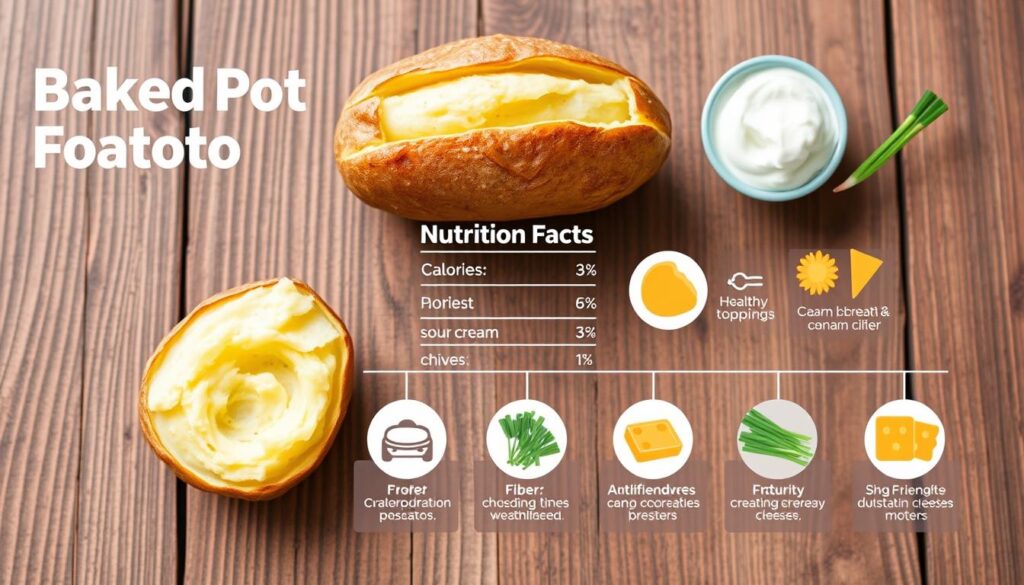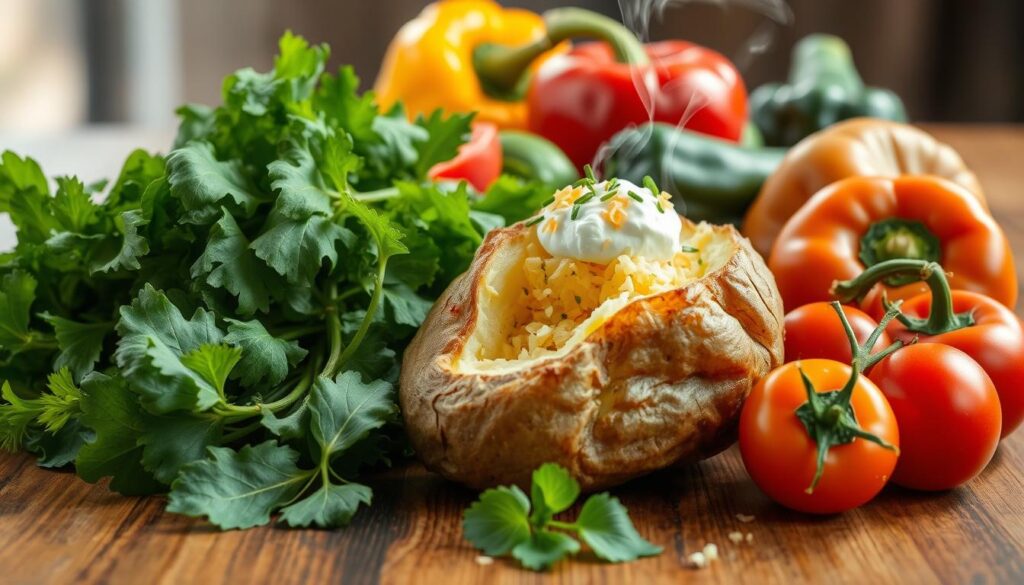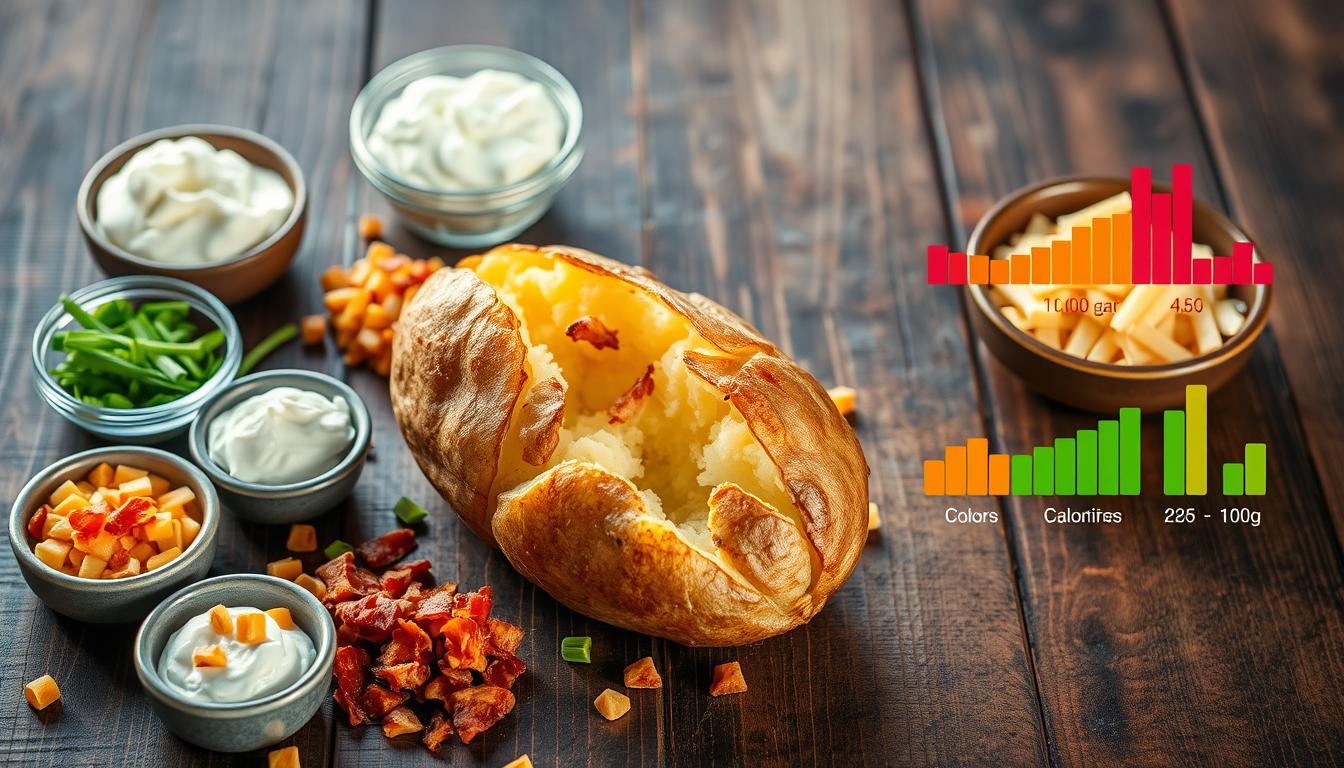Potatoes are a favorite in many homes, and the baked potato is a classic side dish. Ever wondered about its calories and nutrition? This guide will dive into the details, helping you understand baked potatoes better.
Key Takeaways
- Baked potatoes are packed with nutrients like carbs, fiber, and vitamins and minerals.
- A medium-sized baked potato has about 160 calories.
- They are complex carbs, which slow digestion and help control blood sugar.
- Potatoes are rich in potassium, vitamin C, and other nutrients good for health.
- When portioned right, baked potatoes can be a healthy part of your diet.
Understanding Baked Potato Calories and Basic Nutrition
Baked potatoes are a favorite in many homes. They are a tasty and filling side dish. But, knowing their calories and nutrients is key for a healthy diet. Let’s explore the baked potato’s calories and basic nutrition.
Caloric Content Per Serving Size
A medium-sized baked potato (about 173 grams) has about 161 calories. The calories can change based on the potato’s size and toppings. For example, adding butter and cheese can raise the calorie count a lot.
Basic Macronutrient Breakdown
Baked potatoes are mostly carbs, with some protein and very little fat. A medium-sized potato has:
- Carbohydrates: 36.6 grams
- Protein: 4.3 grams
- Fat: 0.2 grams
Daily Value Percentages
A medium-sized baked potato gives you:
- Carbohydrates: 12% of the daily recommended amount
- Protein: 9% of the daily recommended amount
- Vitamin C: 28% of the daily recommended amount
- Potassium: 26% of the daily recommended amount
These percentages show how baked potatoes can be part of a healthy diet.

Remember, toppings and condiments can greatly affect baked potato calories and nutrients. Adding butter, cheese, or sour cream can increase calories and fat. So, it’s important to watch portion sizes and choose toppings wisely when enjoying baked potatoes.
Health Benefits of Including Baked Potatoes in Your Diet
Baked potatoes are tasty and good for you. They are full of vitamins, minerals, and antioxidants. These nutrients help improve your health. Adding baked potatoes to your meals is a smart choice.
Nutrient-Dense Powerhouse
Baked potatoes are a potato nutrition powerhouse. They give you lots of important nutrients in one serving. They are rich in vitamin C, vitamin B6, and potassium. These help your immune system, energy, and heart health.
Fiber-Rich and Filling
One medium baked potato has about 4 grams of fiber. This is great for your digestion and keeps you full. The fiber also helps control blood sugar and aids in weight management.
Antioxidant Protection
Baked potatoes are full of antioxidants like vitamin C, vitamin E, and carotenoids. These fight off harmful free radicals. They help prevent chronic diseases and keep your cells healthy.
Gut-Friendly Resistant Starch
Baked potatoes have resistant starch, like dietary fiber. This starch doesn’t digest and helps good gut bacteria grow. It also improves digestion.
Adding baked potatoes to your diet is a great choice. They offer many health benefits. You can enjoy them plain or with toppings. They are a delicious and healthy part of your meals.

Carbohydrate Content and Glycemic Index
Baked potatoes are good for your health, thanks to their carbs and glycemic index. They are full of complex carbs. These carbs give you energy that lasts and help you stay healthy.
Complex Carbohydrates Explained
Complex carbs are different from simple sugars. They are long chains that digest slowly. This means baked potatoes keep you full longer and give you energy steadily. They don’t cause your blood sugar to spike and then drop.
Impact on Blood Sugar Levels
The glycemic index (GI) shows how fast a food raises blood sugar. Baked potatoes have a moderate GI. This means they don’t make your blood sugar go up and down too much. They’re good for people with diabetes or pre-diabetes because they help keep blood sugar stable.
Fiber Content and Benefits
- Baked potatoes are rich in fiber, with one medium potato having about 3 grams.
- Fiber is great for digestion, heart health, and can help with weight management. It keeps you full and satisfied.
In short, baked potatoes are full of complex carbs and fiber. They have a moderate effect on blood sugar and offer fiber benefits. Adding baked potatoes to your diet can help you meet your carb needs and support your health.
Micronutrient Profile of Baked Potatoes
Baked potatoes are not just comforting and satisfying. They are also packed with essential micronutrients. These tiny tubers have vitamins and minerals that boost your health and well-being.
Vitamin C is a key nutrient in baked potatoes. A medium-sized potato has over 27 milligrams of vitamin C. This is almost half of what you need daily. Vitamin C fights off infections and helps your body absorb nutrients.
| Micronutrient | Amount in Baked Potato (1 medium, 173g) | Percentage of Daily Value |
|---|---|---|
| Vitamin C | 27.8 mg | 46% |
| Vitamin B6 | 0.2 mg | 12% |
| Potassium | 926 mg | 20% |
| Magnesium | 27 mg | 7% |
| Iron | 1.8 mg | 10% |
Baked potatoes also have vitamin B6, which is key for energy and blood cells. They are also rich in potassium, which is good for your heart and muscles.
They also have magnesium and iron. These minerals are important for strong bones and carrying oxygen in the blood. Adding baked potatoes to your diet can help you get these nutrients.
Knowing the micronutrients in baked potatoes helps you make better food choices. It ensures you get the most from your potato nutrition and baked potato nutrition facts in a healthy diet.
Comparing Baked Potato Calories to Other Preparation Methods
The way you cook potatoes can change how many calories they have. Let’s explore how baked potatoes compare to other cooking methods.
Fried vs. Baked Comparison
Fried potatoes, like french fries or chips, are very high in calories. This is because they are cooked in oil. A medium baked potato has about 160 calories. But, a serving of french fries can have over 400 calories.
This shows that baked potatoes are a better choice for your health.
Mashed vs. Baked Analysis
Mashed potatoes can also be high in calories. This is especially true if they’re made with butter or cream. A serving of mashed potatoes can have around 200 calories.
On the other hand, a baked potato has about 160 calories per serving. This makes baked potatoes a healthier option.
Roasted vs. Baked Differences
- Roasted potatoes are tasty but can have more calories than baked potatoes. This is because they are cooked with oil or butter.
- A medium baked potato has about 160 calories. But, a serving of roasted potato can have 180 to 220 calories. This depends on how they are prepared.
Baked potatoes are a lower-calorie choice compared to fried, mashed, and roasted potatoes. Knowing these differences helps you make better choices for your health and fitness goals.
Popular Baked Potato Toppings and Their Caloric Impact
Choosing the right toppings for a baked potato can greatly affect its calorie count. Some toppings add flavor and nutrients, while others can add too many calories and unhealthy fats. Let’s look at some common baked potato toppings and how they might affect your health and weight.
Healthy Potato Topping Options
- Steamed broccoli – A low-calorie, nutrient-dense option that adds fiber and vitamins to your meal.
- Grilled chicken – A lean protein source that can transform your baked potato into a filling and balanced dish.
- Sautéed mushrooms – Rich in antioxidants and low in calories, mushrooms make a tasty and low-calorie topping.
- Roasted vegetables – Opt for a colorful medley of roasted veggies like bell peppers, zucchini, and onions for a flavorful and nutritious topping.
Low-Calorie Potato Topping Alternatives
- Greek yogurt – A creamy and protein-packed alternative to sour cream.
- Salsa – Add a burst of flavor with a low-calorie, vegetable-based salsa.
- Avocado – Creamy and packed with healthy fats, avocado makes a delicious and nutritious topping.
- Chives or scallions – These fresh herbs provide flavor without additional calories.
| Topping | Calories (per 2 tablespoons) |
|---|---|
| Butter | 204 calories |
| Sour Cream | 60 calories |
| Cheese (cheddar) | 114 calories |
| Bacon Bits | 80 calories |
| Chives | 5 calories |
Being mindful of the calories in your baked potato toppings can help you enjoy this dish without feeling guilty. By choosing low-calorie, nutrient-rich options, you can make your baked potato a satisfying and healthy meal.
How to Prepare a Healthy Baked Potato
Baked potatoes can be a nutritious and satisfying part of your meal. The key is to prepare them in a healthy way. From cooking to toppings, there are steps to make a delicious and wholesome baked potato dish.
Best Cooking Methods
The healthiest way to bake potatoes is in the oven. This method cooks the potato evenly without extra fats or oils. To bake, preheat your oven to 400°F, pierce the potatoes with a fork, and bake for 45-60 minutes. They’re done when a fork goes in easily.
Healthy Topping Alternatives
- Greek yogurt: Choose plain, non-fat Greek yogurt instead of sour cream for a protein-rich, lower-calorie topping.
- Avocado: Mash fresh avocado for a creamy, nutrient-dense topping that adds healthy fats.
- Roasted vegetables: Top your baked potato with roasted vegetables like broccoli, cauliflower, or Brussels sprouts.
- Salsa: Use a fresh salsa made with diced tomatoes, onions, cilantro, and spices for a flavorful, low-calorie option.
- Beans: Add black beans, kidney beans, or chickpeas for a protein-rich topping.
By choosing healthy cooking methods and toppings, you can make a baked potato recipe that’s delicious and nutritious. Try different toppings to find your favorite healthy potato toppings combination.
Weight Management and Baked Potato Consumption
The baked potato is more than just a side dish. It’s a key player in weight management. This vegetable is packed with nutrients and can help control weight.
A medium-sized baked potato has about 150 calories. This makes it a low-calorie choice compared to many other foods. By controlling portion sizes of baked potatoes, you can enjoy them without overeating.
The complex carbohydrates in baked potatoes keep you full longer. This can help you avoid snacking too much. The fiber content also supports a healthy digestive system, which aids in weight management.
“Incorporating baked potatoes into a balanced meal plan can be a smart strategy for weight management, as long as portion sizes are kept in check and healthy toppings are used.”
To find out how much potato is 500 calories, consider the size and how it’s prepared. A medium-sized baked potato has about 150 calories. So, you’d need 3-4 baked potatoes to reach 500 calories.
For baked potatoes to be part of a weight management plan, watch your portions. Choose low-calorie toppings and pair them with other nutrient-rich foods. This way, you get a balanced diet.
Common Myths About Potato Calories Debunked
There are many myths about baked potato calories and nutrition. Let’s look at the science and expert opinions to clear these up. This way, you’ll get the right info.
Scientific Evidence and Research
Many think potatoes are fattening, but they’re not. A medium-sized baked potato has about 130 calories. It’s a low-calorie food. The potato’s carbs, fiber, and nutrients make it good for a healthy diet.
Also, research shows baked potatoes’ glycemic index isn’t as high as thought. When eaten with other foods, they don’t raise blood sugar much. This proves potatoes aren’t bad for blood sugar control.
Expert Opinions and Studies
Nutrition experts say baked potatoes are good in moderation. Samantha Cassetty, a registered dietitian, says, “Potatoes are versatile, affordable, and full of nutrients. They’re good for a healthy diet.” She notes how cooking and toppings affect their nutrition.
A study in the Journal of the American College of Nutrition found no harm from baked potatoes in a calorie-controlled diet. This shows potatoes don’t hinder weight loss or management.
Understanding the science and expert views lets you enjoy baked potatoes in a healthy way. It’s not the potato itself, but how it’s cooked and topped that matters.
Incorporating Baked Potatoes into a Balanced Meal Plan
Baked potatoes are great for any meal plan. They are full of nutrients and can help you reach your health goals. Knowing how many calories they have is key to using them wisely.
When adding baked potatoes to your meals, watch your portion size. A baked potato has about 150-200 calories, depending on its size. Stick to a medium-sized potato for a good serving size.
Here are some tips to balance your baked potato meals:
- Pair your baked potato with lean protein like grilled chicken, fish, or tofu for a full meal.
- Add veggies like broccoli, spinach, or tomatoes on top for extra fiber and nutrients.
- Use low-fat or non-fat dairy like Greek yogurt or cottage cheese for creamy toppings without too many calories.
- Try herbs, spices, and other seasonings to make your baked potato taste great without extra calories.
By following these tips, you can enjoy baked potatoes while keeping your meals balanced and healthy. Just remember to watch your portion sizes and choose healthy toppings. This way, baked potatoes can help you meet your health goals.
| Baked Potato Calorie Content | Serving Size | Calories |
|---|---|---|
| Small Baked Potato | 3 oz (85g) | 150 calories |
| Medium Baked Potato | 6 oz (170g) | 200 calories |
| Large Baked Potato | 8 oz (225g) | 280 calories |
The calorie content of a baked potato changes with its size. By controlling your portions and choosing healthy toppings, you can enjoy baked potatoes without overdoing it on calories.
Storage Tips to Maintain Nutritional Value
Keeping your potatoes fresh is crucial for their potato nutrition and baked potato calories. Simple steps can help your potatoes stay nutritious and tasty.
Proper Storage Methods
To keep your potatoes at their best, follow these tips:
- Store potatoes in a cool, dark spot like a pantry or cellar. Don’t put them in the fridge, as cold can change their taste and texture.
- Use a paper or mesh bag, or a cardboard box for storage. This lets air in and keeps them dry, preventing spoilage.
- Make sure the storage area is away from sunlight. Sunlight can turn potatoes green and toxic.
Shelf Life Guidelines
Proper storage helps your baked potatoes stay nutritious for a while:
- Uncooked whole potatoes can last 2-3 months in a cool, dark spot.
- Cooked baked potatoes can stay in the fridge for 3-5 days.
- For longer storage, freeze cooked baked potatoes for up to 12 months. This keeps their nutrients and taste.
By storing your potatoes right, you can enjoy their health benefits. This way, you also reduce waste and keep your potatoes fresh.
Conclusion
In this detailed guide, we’ve looked at baked potato calories and their nutritional benefits. We’ve covered the calories, nutrients, and health perks of adding them to your meals. This article aims to help you make smart choices about eating potatoes.
The potato nutrition facts show that baked potatoes are packed with vitamins, minerals, and carbs. They’re great for a healthy meal. Knowing how to prepare and top them can boost their nutritional value.
Remember, baked potatoes are good for a healthy diet. Try new ways to cook them and enjoy their many benefits. With what you’ve learned, you can choose healthier options that benefit your health.
FAQ
How many calories are in a baked potato?
A medium-sized baked potato, about 173g, has around 161 calories. This is without any toppings.
Is a baked potato a healthy choice?
Yes, baked potatoes are a healthy option. They offer complex carbs, fiber, and essential vitamins and minerals.
How many calories are in a baked potato with butter and cheese?
Adding butter and cheese increases a baked potato’s calories. A medium potato with 1 tablespoon of butter and 2 tablespoons of cheese has about 360 calories.
How much potato is 500 calories?
About 3 medium-sized (173g) baked potatoes without toppings have around 500 calories.
Are baked potatoes considered a good carb?
Yes, baked potatoes are a good carb source. They are rich in fiber and have a moderate glycemic index. This means they offer sustained energy and may affect blood sugar levels less than simple carbs.


5 thoughts on “Baked Potato Calories: Complete Nutrition Facts Guide”